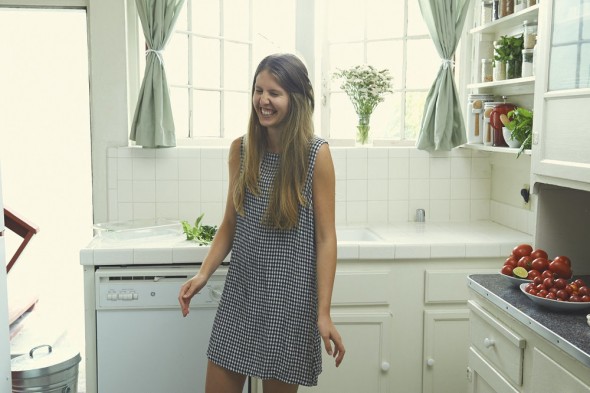Emily's business, The Cooking Habit, is 'culinary and consumer education for the modern couple.' So often we talk about the benefits of cooking for others and sharing in a meal with one or more people. But Emily's experience and passion led her to see an opportunity in teaching domestic partners how to cook together, to strengthen the cooking skills of the overall household.
When did you know that you wanted to work in food?
Prior to embarking on my journey in entrepreneurship, I worked as a bread baker and on farms abroad (via WWOOF) but hadn't seriously considered pursuing a career in the food industry. After working for several years in at a job that left me hungry for connection and fulfillment, I decided to step out of my comfort zone and explore how I could contribute to improving the food system. During a walk with my mentor/friend about my home economics business idea, she advised me to focus my energy on the kitchen which she knew was my happy place. It was a really powerful moment for me that led me to reflect on own journey with food and how my perspective might be helpful to others who are looking to make cooking a part of their routine.
How did you get your current good food job?
After friends started asking me for advice on all things cooking, I woke up to the idea that I wanted to work in the food industry. I connected the dots between my experiences, my expertise, and my values and decided to create my own good food job. With so many tips, tricks, and short cuts to home cooking offered in all of the food media I consume, I noticed that there was no substantive discussion about how to cook successfully with others. I was surprised that the idea of partners sharing food responsibilities was not discussed. I use my business to fill that hole in the conversation about cooking at home. I work primarily with couples to help them create a lasting cooking habit that both partners contribute to and benefit from equally. I love the opportunity to facilitate conversations and offer solutions to the inevitable kitchen conflicts that arise with multiple cooks in the kitchen.
How did your previous work or life experience prepare you for a good food job?
Coming from a background as an urban planning consultant, I previously discounted my many experiences working and interacting with people directly in their homes: as a personal assistant, house cleaner, nanny, tutor, and farm volunteer. These experiences have offered me an intimate view of how people from all over the world interact with food. In many instances, I was able to participate in daily meal rituals and understand what habits contribute to them. Seeing first hand how people shop, cook, and eat has greatly influenced my own behavior and prepared me to share these valuable lessons with my clients.
What was the greatest obstacle you had to overcome in pursuing your Good Food Job dream?
The biggest obstacle I had to overcome was quitting my job to pursue my Good Food Job dream of starting a business. I had been working full-time while developing my business on the side and realized it was unrealistic for me to do both. It took months to build up the courage and move beyond the fear that is involved in making a drastic career move and leaving a consistent income. I felt extremely vulnerable during that transition. Along the way to leaving my job, I was lucky enough to connect with others who had made a similar leap, whether is was quitting an unfulfilling job, starting a business, or moving across the country. It was so invaluable to meet and hear other people's stories and realize that I was not alone in my fear and self-doubt. Having a strong community of people who supported and encouraged me along the way was essential to help me persevere to accomplish my goals.
Name one positive thing that a former employer taught you that you continue to appreciate?
A former boss stressed the importance of becoming a skilled listener. On one hand you have to listen your customers to understand their needs but it is also important to listen to yourself and figure out what's driving you. Although the advice was given in my early days in retail customer service, I have carried it with me.
What can you identify as the greatest opportunities in food right now?
I think the greatest opportunities in food right now are in food waste recovery and education. I am inspired by the many organizations across the country working at the intersection of food waste and food access. With so much food wasted and so many people going hungry, I have no doubt the food waste recovery industry will continue to develop and grow. As a compliment to creating efficient food systems, education is absolutely necessary to create a cultural change among consumers.
If you could be compensated for your work with something other than money, what would it be?
Sharing a meal with the people that I'm working with and for.









